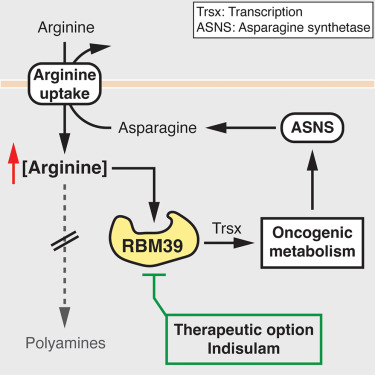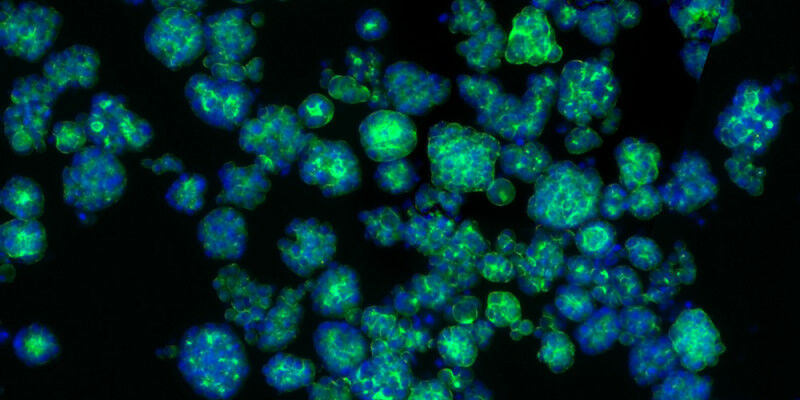博文
癌症研究:代谢驱动肿瘤发展
||
癌症研究:代谢驱动肿瘤发展
诸平

Fig. 2 Graphical abstract
据瑞士巴塞尔大学(University of Basel)2023年10月9日提供的消息,该校的研究人员使用肿瘤类器官(上述图1中绿色/蓝色)作为模型来研究肝细胞癌代谢变化,结果显示代谢驱动肿瘤发展(Cancer research: Metabolite drives tumor development)。
癌细胞是变色龙(chameleons)。他们完全改变了新陈代谢以不断生长。巴塞尔大学的科学家发现,高水平的氨基酸精氨酸(amino acid arginine)会驱动代谢重编程,从而促进肿瘤生长。这项研究提出了改善肝癌治疗的新途径。
肝脏是一个重要的器官,在体内具有许多重要的功能。它代谢营养、储存能量、调节血糖水平,在解毒、清除有害成分和药物方面发挥着至关重要的作用。肝癌是世界上最致命的癌症之一。导致肝癌的疾病包括肥胖、过量饮酒和丙型肝炎感染。早期诊断和适当的治疗策略对于改善肝癌的治疗至关重要。
癌症作为一种代谢性疾病(Cancer as a metabolic disease)
在过去的十年中,科学家在了解癌症的多个方面取得了很大进展。从历史上看,它长期以来一直被视为细胞增殖紊乱。然而,越来越多的证据表明癌症是一种代谢性疾病。换句话说,当细胞重新连接其新陈代谢以允许不受控制的细胞增殖时,癌症就会出现。细胞如何改变其新陈代谢以及这种变化又如何导致致瘤性?巴塞尔大学 Biozentrum 教授迈克尔·哈尔(Michael N. Hall)领导的研究人员,通过研究发现了肝癌细胞代谢重连的关键驱动因素。相关研究结果于2023年10月6日已经在《细胞》(Cell)杂志网站发表,详见——Dirk Mossmann, Christoph Müller, Sujin Park, Brendan Ryback, Marco Colombi, Nathalie Ritter, Diana Weißenberger, Eva Dazert, Mairene Coto-Llerena, Sandro Nuciforo, Lauriane Blukacz, Caner Ercan, Veronica Jimenez, Salvatore Piscuoglio, Fatima Bosch, Luigi M. Terracciano, Uwe Sauer, Markus H. Heim7, Michael N. Hall. Arginine reprograms metabolism in liver cancer via RBM39. Cell, (2023), DOI: 10.1016/j.cell.2023.09.011. Available online 6 October 2023. https://www.sciencedirect.com/science/article/pii/S0092867423010322
参与此项研究的除了来自巴塞尔大学 Biozentrum(Biozentrum, University of Basel, Basel, Switzerland)的研究人员之外,还有来自瑞士苏黎世联邦理工学院(ETH Zürich, Zürich, Switzerland)、巴塞尔大学医院(University Hospital Basel, Basel, Switzerland)、西班牙巴塞罗自治那大学(Universitat Autònoma de Barcelona, Barcelona, Spain)以及瑞士克劳尼斯大学胃肠和肝脏疾病中心(Clarunis University Center for Gastrointestinal and Liver Diseases, Basel, Switzerland)的研究人员。
肝癌中精氨酸的积累(Accumulation of arginine in liver cancer)
健康的肝细胞在转变为癌细胞时会逐渐改变其行为。它们重新编程新陈代谢以尽可能快地生长,例如,它们比正常细胞消耗更多的葡萄糖,并且增强营养物质的吸收。
上述研究论文的第一作者德克·莫斯曼(Dirk Mossmann)博士说:“我们研究了小鼠和患者的肝肿瘤样本,发现精氨酸水平升高,尽管癌细胞产生很少或不产生这种氨基酸。而肿瘤细胞通过增加精氨酸的摄取和抑制其消耗来积累高水平的精氨酸。此外,我们发现高水平的精氨酸对于肿瘤的发展是必需的,与氨基酸在蛋白质合成中的作用无关。这就引出了一个问题,精氨酸如何导致致瘤性(tumorigenicity)?”
精氨酸在肿瘤生长中的作用(The role of arginine in tumor growth)
高浓度的精氨酸与特定因子(specific factor)结合,触发代谢重编程并通过调节代谢基因的表达促进肿瘤生长。结果,肿瘤细胞恢复到未分化的胚胎细胞(embryonic cell)状态,在这种状态下它们可以无限分裂。有趣的是,肿瘤细胞还以另一种方式受益于增加精氨酸的摄取。德克·莫斯曼说:“我们的免疫细胞依赖精氨酸才能正常发挥作用。因此,消耗肿瘤环境中的精氨酸有助于肿瘤细胞逃避免疫系统。”
对肝癌诊断和治疗的意义(Implications for the diagnosis and therapy of liver cancer)
这些发现对癌症治疗意味着什么?科学家们建议针对特定的精氨酸结合因子而不是消耗精氨酸。“当用抗癌药物Indisulam治疗肝脏肿瘤时,我们诱导该因子降解,从而防止代谢重编程,”德克·莫斯曼补充道。“通过这一途径,人们可以避免降低整体精氨酸水平带来的不良副作用,例如损害需要精氨酸才能正常工作的免疫细胞。” 此外,精氨酸水平升高等代谢变化可以作为早期检测癌症的生物标志物,这对于成功的癌症治疗和患者生存至关重要。
本研究得到了德国研究基金会(German Research Foundation简称DFG)、亚历山大·冯·洪堡基金会(Alexander von Humboldt Foundation)、欧洲研究理事会(European Research Council, MERiC)、瑞士国家科学基金会(Swiss National Science Foundation: NCCR RNA and Disease)、斯约堡基金会(Sjöberg Foundation)以及路易斯-让泰基金会(Louis-Jeantet Foundation)的支持。
上述介绍,仅供参考。欲了解更多信息,敬请注意浏览原文或者相关报道。
• Arginine is increased in liver cancer despite suppression of the urea cycle
• Increased uptake and decreased conversion to polyamines maintain high arginine
• Arginine binds the transcription regulator RBM39 to promote oncogenic metabolism
• RBM39 dependency in liver cancer could be exploited by molecular glue degraders
Metabolic reprogramming is a hallmark of cancer. However, mechanisms underlying metabolic reprogramming and how altered metabolism in turn enhances tumorigenicity are poorly understood. Here, we report that arginine levels are elevated in murine and patient hepatocellular carcinoma (HCC), despite reduced expression of arginine synthesis genes. Tumor cells accumulate high levels of arginine due to increased uptake and reduced arginine-to-polyamine conversion. Importantly, the high levels of arginine promote tumor formation via further metabolic reprogramming, including changes in glucose, amino acid, nucleotide, and fatty acid metabolism. Mechanistically, arginine binds RNA-binding motif protein 39 (RBM39) to control expression of metabolic genes. RBM39-mediated upregulation of asparagine synthesis leads to enhanced arginine uptake, creating a positive feedback loop to sustain high arginine levels and oncogenic metabolism. Thus, arginine is a second messenger-like molecule that reprograms metabolism to promote tumor growth.
https://blog.sciencenet.cn/blog-212210-1405411.html
上一篇:研究人员用超快“电子相机”捕捉质子解离过程
下一篇:免疫细胞被认为是肠道中的“代谢工厂”
